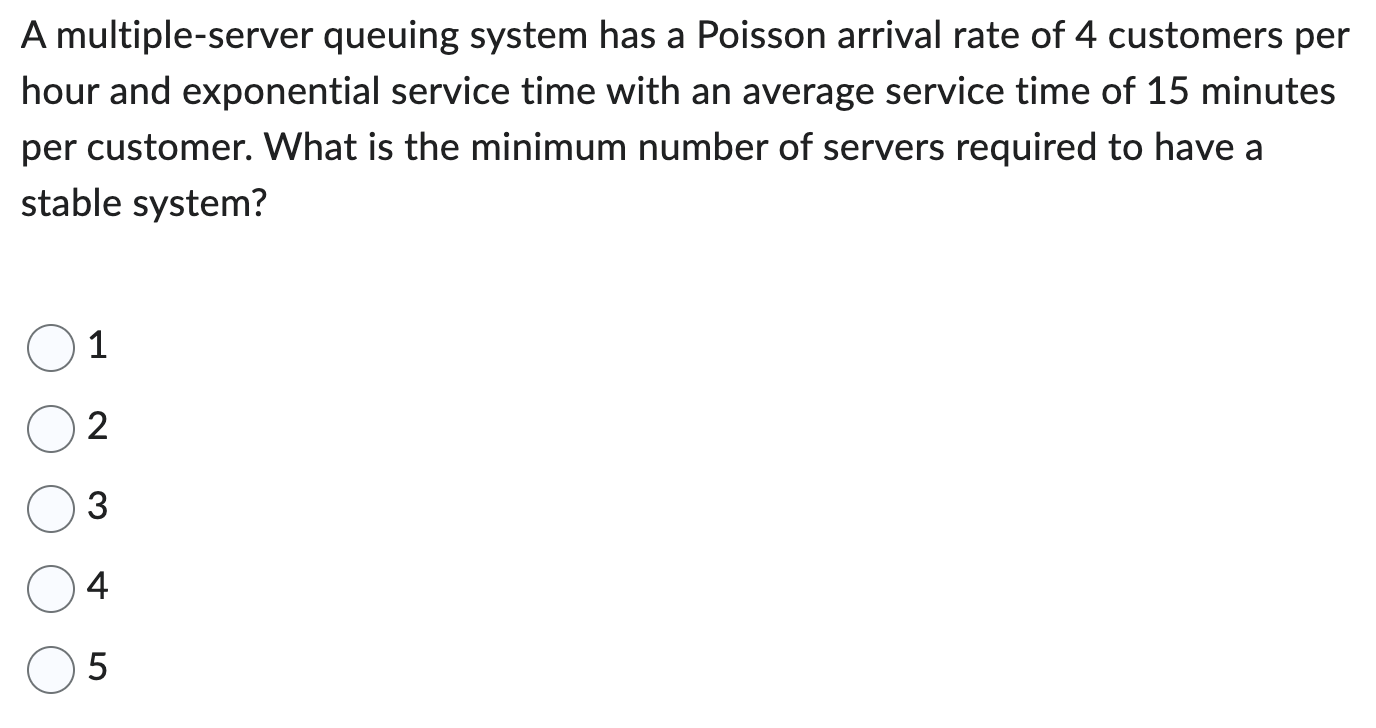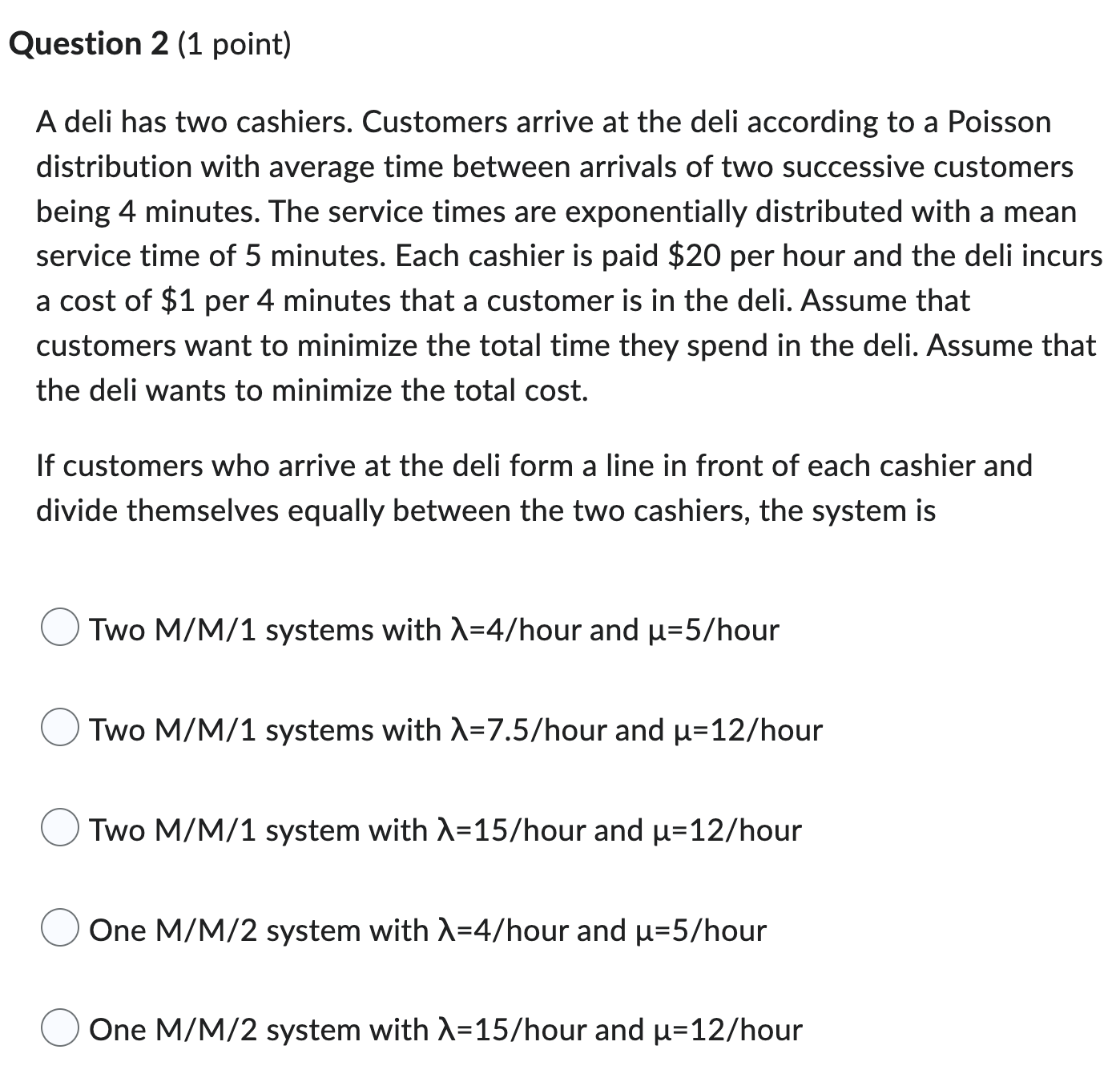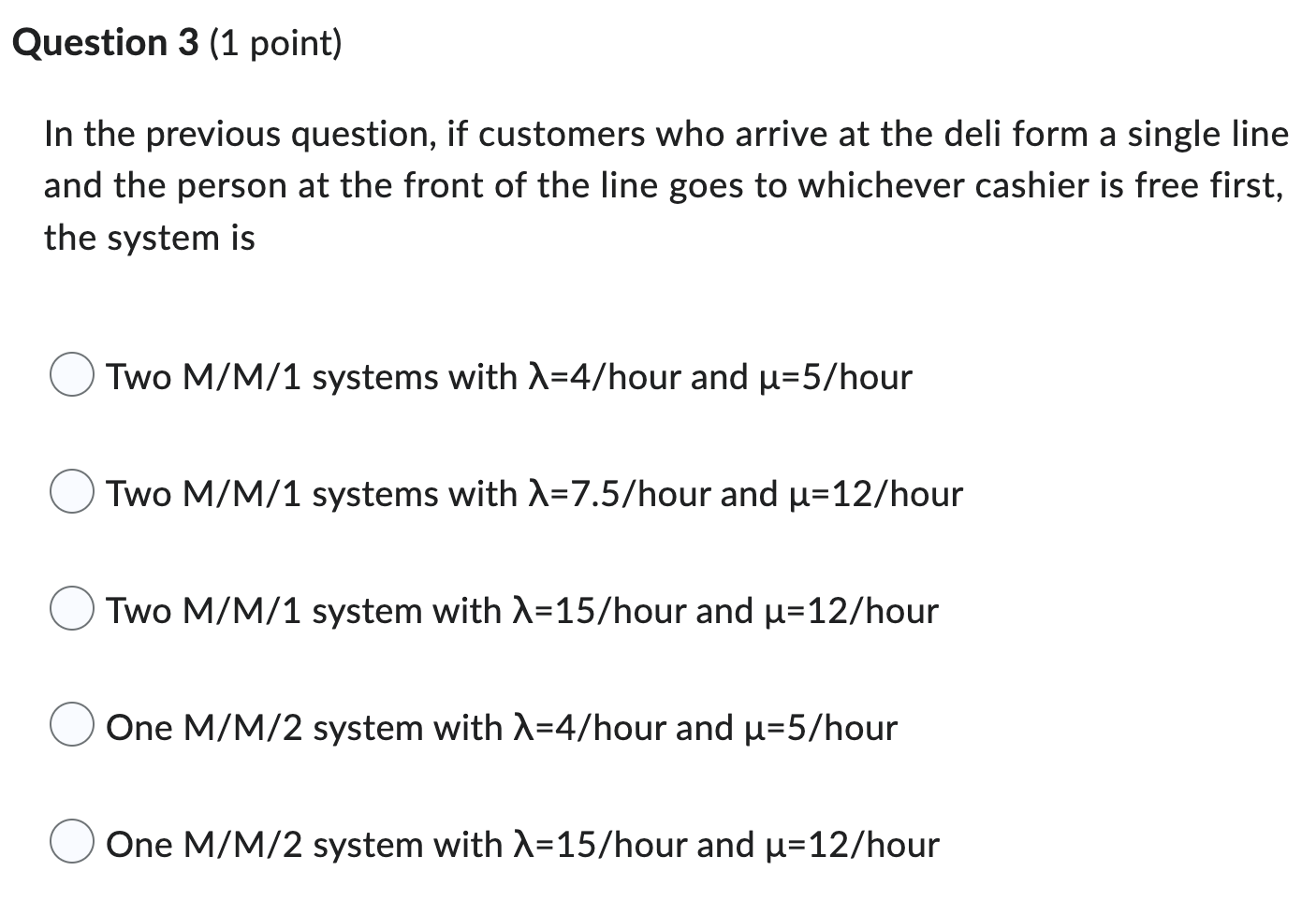Answered step by step
Verified Expert Solution
Question
1 Approved Answer
A multiple-server queuing system has a Poisson arrival rate of 4 customers per hour and exponential service time with an average service time of 15


 A multiple-server queuing system has a Poisson arrival rate of 4 customers per hour and exponential service time with an average service time of 15 minutes per customer. What is the minimum number of servers required to have a stable system? 1 2 3 4 5 Question 2 (1 point) A deli has two cashiers. Customers arrive at the deli according to a Poisson distribution with average time between arrivals of two successive customers being 4 minutes. The service times are exponentially distributed with a mean service time of 5 minutes. Each cashier is paid $20 per hour and the deli incurs a cost of $1 per 4 minutes that a customer is in the deli. Assume that customers want to minimize the total time they spend in the deli. Assume that the deli wants to minimize the total cost. If customers who arrive at the deli form a line in front of each cashier and divide themselves equally between the two cashiers, the system is Two M/M/1 systems with =4/ hour and =5/ hour Two M/M/1 systems with =7.5/ hour and =12/ hour Two M/M/1 system with =15/ hour and =12/ hour One M/M/2 system with =4/ hour and =5/ hour One M/M/2 system with =15/ hour and =12/ hour In the previous question, if customers who arrive at the deli form a single line and the person at the front of the line goes to whichever cashier is free first, the system is Two M/M/1 systems with =4/ hour and =5/ hour Two M/M/1 systems with =7.5/ hour and =12/ hour Two M/M/1 system with =15/ hour and =12/ hour One M/M/2 system with =4/ hour and =5/ hour One M/M/2 system with =15/ hour and =12/ hour A multiple-server queuing system has a Poisson arrival rate of 4 customers per hour and exponential service time with an average service time of 15 minutes per customer. What is the minimum number of servers required to have a stable system? 1 2 3 4 5 Question 2 (1 point) A deli has two cashiers. Customers arrive at the deli according to a Poisson distribution with average time between arrivals of two successive customers being 4 minutes. The service times are exponentially distributed with a mean service time of 5 minutes. Each cashier is paid $20 per hour and the deli incurs a cost of $1 per 4 minutes that a customer is in the deli. Assume that customers want to minimize the total time they spend in the deli. Assume that the deli wants to minimize the total cost. If customers who arrive at the deli form a line in front of each cashier and divide themselves equally between the two cashiers, the system is Two M/M/1 systems with =4/ hour and =5/ hour Two M/M/1 systems with =7.5/ hour and =12/ hour Two M/M/1 system with =15/ hour and =12/ hour One M/M/2 system with =4/ hour and =5/ hour One M/M/2 system with =15/ hour and =12/ hour In the previous question, if customers who arrive at the deli form a single line and the person at the front of the line goes to whichever cashier is free first, the system is Two M/M/1 systems with =4/ hour and =5/ hour Two M/M/1 systems with =7.5/ hour and =12/ hour Two M/M/1 system with =15/ hour and =12/ hour One M/M/2 system with =4/ hour and =5/ hour One M/M/2 system with =15/ hour and =12/ hour
A multiple-server queuing system has a Poisson arrival rate of 4 customers per hour and exponential service time with an average service time of 15 minutes per customer. What is the minimum number of servers required to have a stable system? 1 2 3 4 5 Question 2 (1 point) A deli has two cashiers. Customers arrive at the deli according to a Poisson distribution with average time between arrivals of two successive customers being 4 minutes. The service times are exponentially distributed with a mean service time of 5 minutes. Each cashier is paid $20 per hour and the deli incurs a cost of $1 per 4 minutes that a customer is in the deli. Assume that customers want to minimize the total time they spend in the deli. Assume that the deli wants to minimize the total cost. If customers who arrive at the deli form a line in front of each cashier and divide themselves equally between the two cashiers, the system is Two M/M/1 systems with =4/ hour and =5/ hour Two M/M/1 systems with =7.5/ hour and =12/ hour Two M/M/1 system with =15/ hour and =12/ hour One M/M/2 system with =4/ hour and =5/ hour One M/M/2 system with =15/ hour and =12/ hour In the previous question, if customers who arrive at the deli form a single line and the person at the front of the line goes to whichever cashier is free first, the system is Two M/M/1 systems with =4/ hour and =5/ hour Two M/M/1 systems with =7.5/ hour and =12/ hour Two M/M/1 system with =15/ hour and =12/ hour One M/M/2 system with =4/ hour and =5/ hour One M/M/2 system with =15/ hour and =12/ hour A multiple-server queuing system has a Poisson arrival rate of 4 customers per hour and exponential service time with an average service time of 15 minutes per customer. What is the minimum number of servers required to have a stable system? 1 2 3 4 5 Question 2 (1 point) A deli has two cashiers. Customers arrive at the deli according to a Poisson distribution with average time between arrivals of two successive customers being 4 minutes. The service times are exponentially distributed with a mean service time of 5 minutes. Each cashier is paid $20 per hour and the deli incurs a cost of $1 per 4 minutes that a customer is in the deli. Assume that customers want to minimize the total time they spend in the deli. Assume that the deli wants to minimize the total cost. If customers who arrive at the deli form a line in front of each cashier and divide themselves equally between the two cashiers, the system is Two M/M/1 systems with =4/ hour and =5/ hour Two M/M/1 systems with =7.5/ hour and =12/ hour Two M/M/1 system with =15/ hour and =12/ hour One M/M/2 system with =4/ hour and =5/ hour One M/M/2 system with =15/ hour and =12/ hour In the previous question, if customers who arrive at the deli form a single line and the person at the front of the line goes to whichever cashier is free first, the system is Two M/M/1 systems with =4/ hour and =5/ hour Two M/M/1 systems with =7.5/ hour and =12/ hour Two M/M/1 system with =15/ hour and =12/ hour One M/M/2 system with =4/ hour and =5/ hour One M/M/2 system with =15/ hour and =12/ hour Step by Step Solution
There are 3 Steps involved in it
Step: 1

Get Instant Access to Expert-Tailored Solutions
See step-by-step solutions with expert insights and AI powered tools for academic success
Step: 2

Step: 3

Ace Your Homework with AI
Get the answers you need in no time with our AI-driven, step-by-step assistance
Get Started


